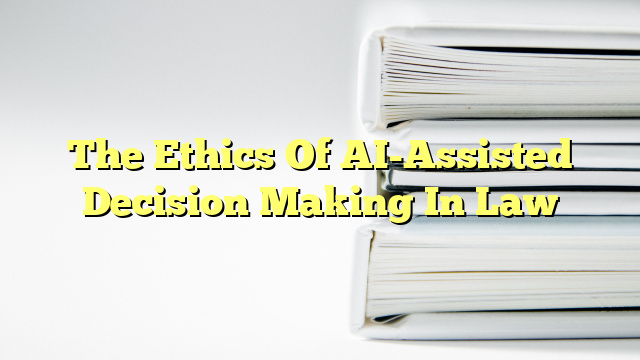Table of Contents
- What is AI Ethics and Law?
- What are the Ethical Issues of AI in Law?
- Can Artificial Intelligence Make Ethical Decisions?
- What are the Ethics of AI Justice?
- Conclusion
What is AI Ethics and Law?
AI ethics and law is a field of study that attempts to understand and regulate the use of AI in decision making processes. AI-assisted decision making in law involves creating and utilizing AI programs to improve decision-making processes within the legal system. AI programs can be used to assess evidence, determine legal outcomes, and assist in jury selection. AI can also help to detect and prevent fraud, identify potential criminal activities, and provide legal advice to people who are unable to afford a lawyer.
The use of AI in legal decision making raises a number of ethical issues. These issues include concerns about privacy, fairness, accountability, and transparency. There is also the potential for AI-assisted decisions to be biased or to be based on faulty assumptions. Furthermore, AI-assisted decisions may not take into account the broader social, political, and economic contexts in which legal decisions are made.
What are the Ethical Issues of AI in Law?
The ethical issues of AI in law include questions about privacy, fairness, accountability, and transparency. Regarding privacy, AI systems may require access to sensitive personal data in order to make decisions. This raises the issue of how to ensure that data is collected and used in a responsible and ethical manner.
Regarding fairness, there is the potential for AI-assisted decisions to be biased in favour of one particular individual or group. This could lead to unfair outcomes and discrimination against certain individuals or groups.
Regarding accountability and transparency, AI-assisted decisions should be open to scrutiny and challenge. Furthermore, it should be possible to explain the logic and reasoning behind an AI-assisted decision.
Finally, AI-assisted decisions should take into account the broader social, political, and economic contexts in which legal decisions are made. This is to ensure that decisions are not made in a vacuum and are reflective of the values and interests of society as a whole.
Can Artificial Intelligence Make Ethical Decisions?
In general, it is not possible for AI-assisted decision making to be completely ethical. This is because AI systems are limited in their ability to take into account the full range of factors that go into making an ethical decision. AI systems can use algorithms to identify patterns and draw conclusions, but they cannot always perceive the nuances and complexities of the human experience.
It is important to note, however, that AI-assisted decision making can still be used to make ethical decisions. AI systems can be designed to take into account ethical considerations and can be programmed to weigh different factors in order to make an ethical decision.
What are the Ethics of AI Justice?
The ethics of AI justice involve considering the implications of AI-assisted decision making on human rights, justice, and fairness. AI systems should not be used to make decisions that could have a detrimental effect on individuals or groups. Furthermore, decisions made by AI systems should be transparent and open to challenge.
AI systems should also be designed to take into account the broader social and political contexts in which decisions are made. AI-assisted decision making should not be used to make decisions that are out of step with prevailing social norms and values.
Conclusion
The use of AI-assisted decision making in law raises a number of ethical issues. These include concerns about privacy, fairness, accountability, and transparency. Additionally, AI-assisted decisions should take into account the broader social, political, and economic contexts in which decisions are made. Finally, AI systems should

